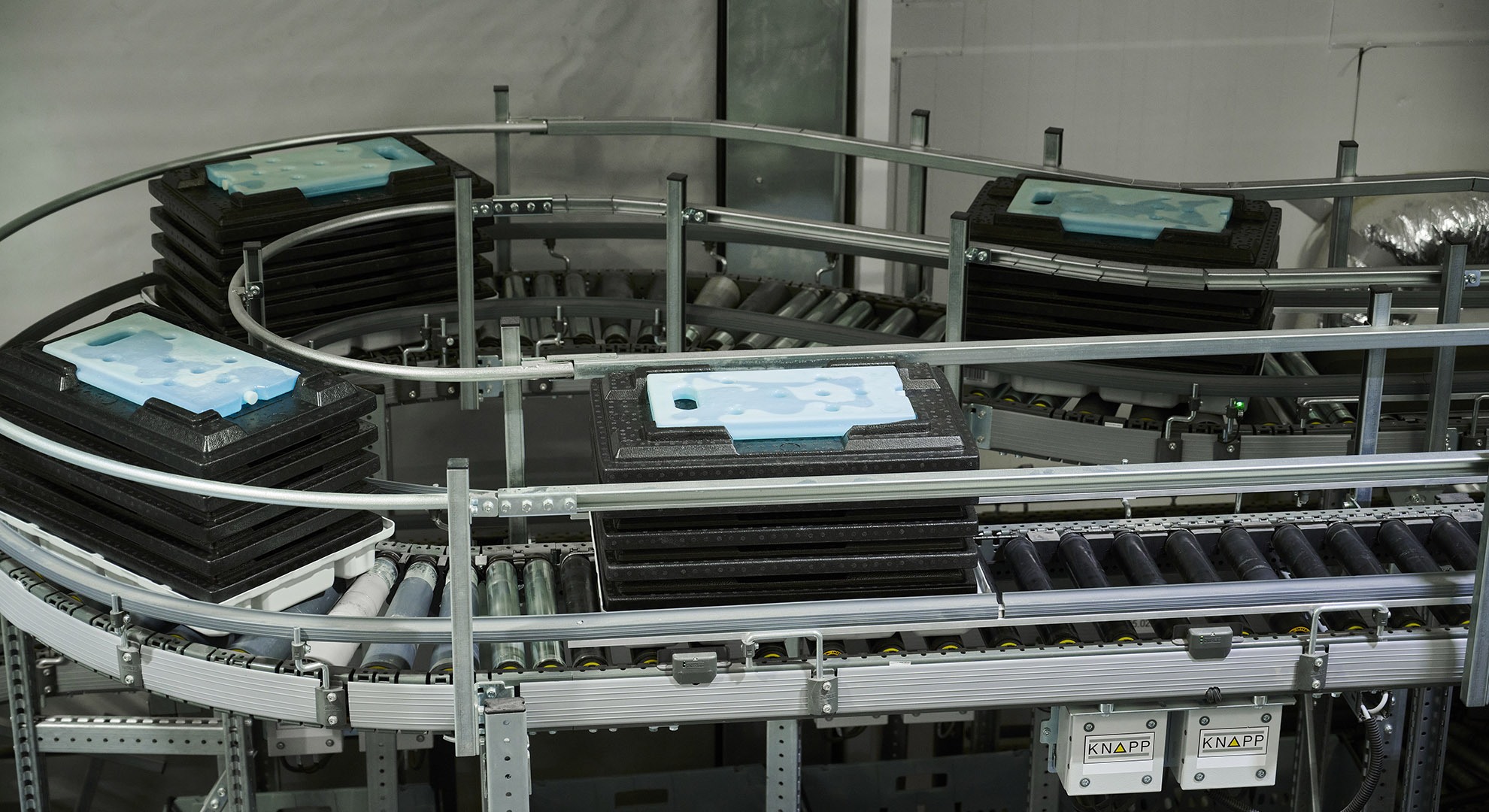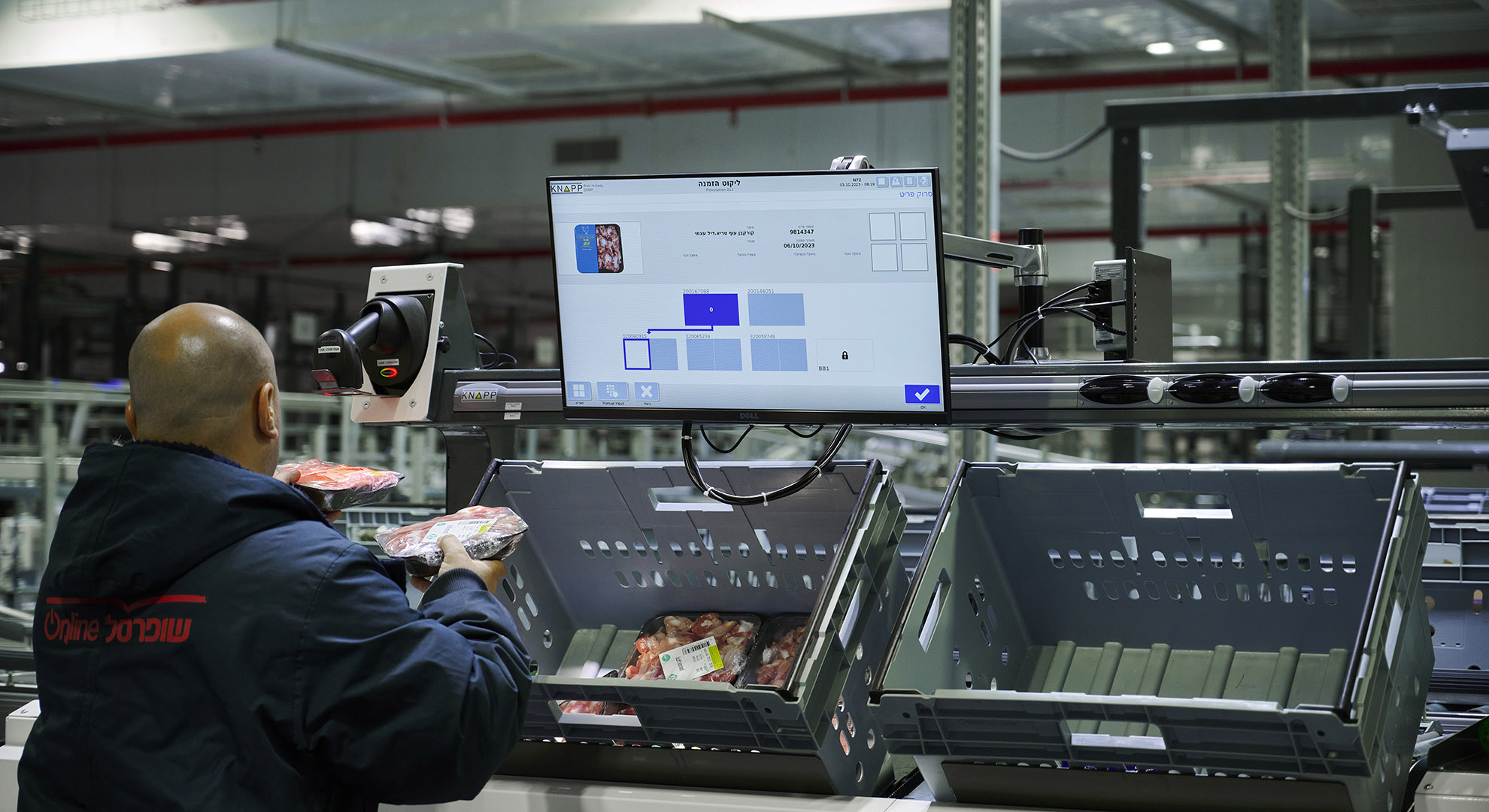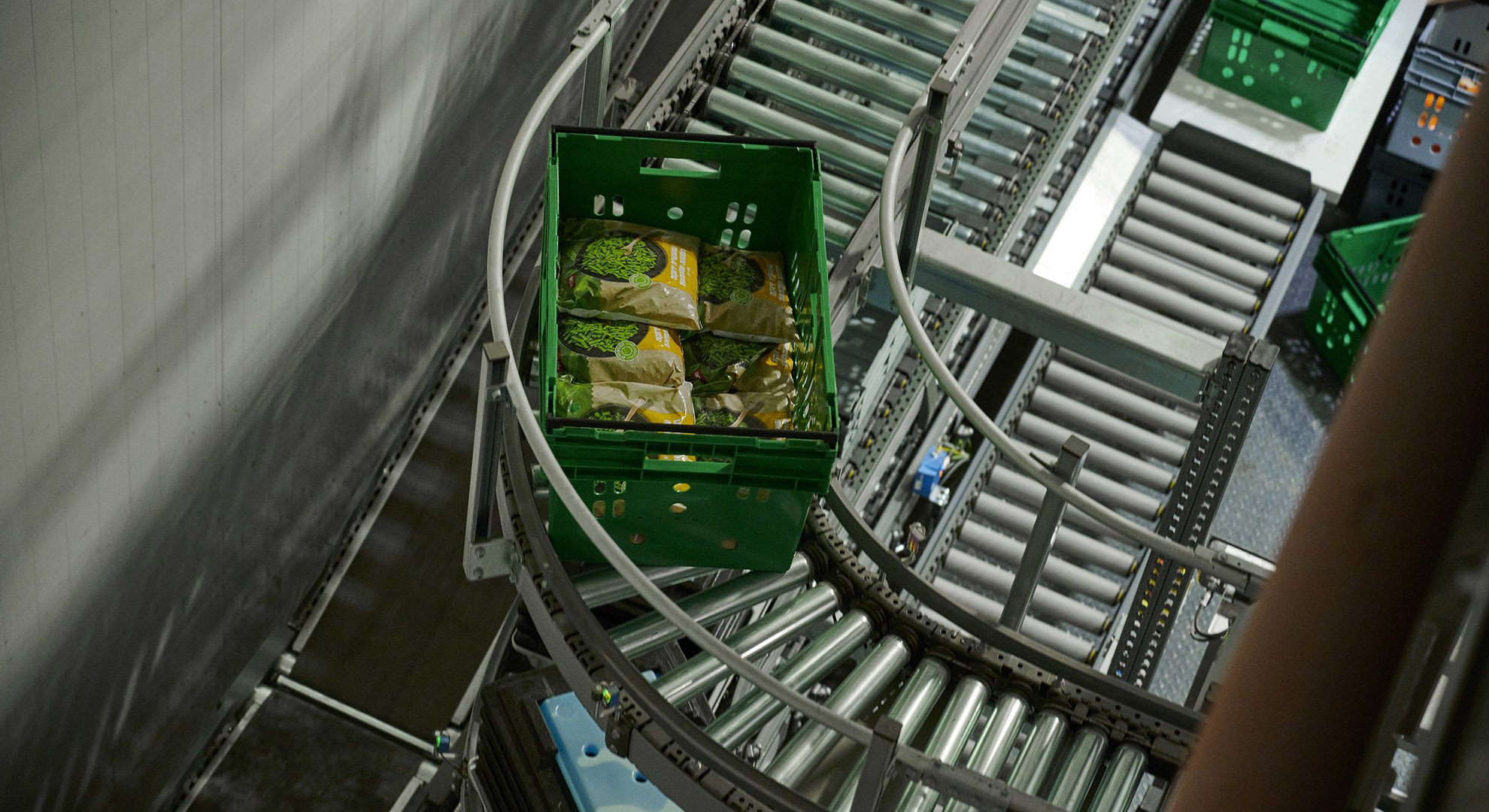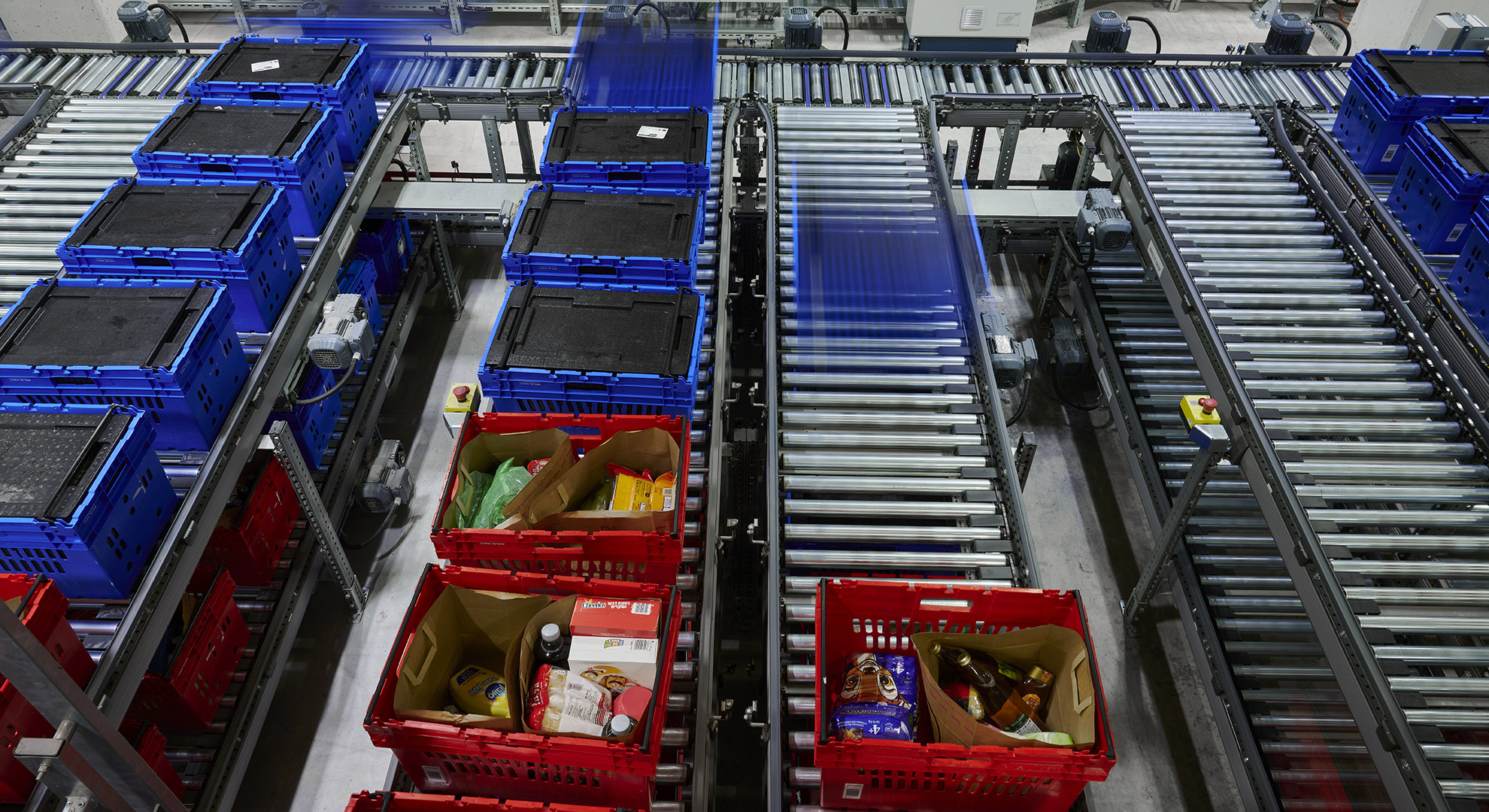Increases in demand have led the selection of frozen foods available in stores to markedly expand. This trend goes hand in hand with new challenges for logistics, which are especially complex when it comes to operating freezer warehouses for food retail. A high degree of automation is one of the most important factors for success, especially considering the current skilled labor shortage. Additionally, the cold chain must be maintained from end to end, ensuring that the temperature of the goods remains optimal.
In this blog post, we introduce what makes automating freezer warehouses special, as well as our own concepts and technologies. We then use a best practice example to show how our partner Shufersal puts these strategies into practice for their e-grocery business.
Cold chain automation re-conceptualized
From frozen pizza to fries and frozen vegetables; from fish sticks to spring rolls and ice cream: The selection of frozen foods has increased significantly in the last few years as they have become more and more popular and as sales figures continue to grow. Additionally, e-grocery, with its wide selection of goods and convenient home delivery services, is also spurring growth here. But what does this trend mean for the logistics solutions running in the background?
Cool logistics for food retail
Automated processes pay off in all areas of logistics – especially when it comes to work at the lowest temperatures. The skilled labor shortage and high physical strain placed on workers in these icy temperatures are a clear sign for highly automated processes. Quantitative factors also play a role in choosing automation. Top efficiency and profitability, paired with ergonomic workflows, are key to success in this sector. Only automated processes make the short lead times possible that are necessary to ensure items remain at the optimal level of freshness and quality.
But how can automation be used while maintaining the cold chain? How do systems need to be adapted to the lowest temperatures?
Staying chill along the way
We keep an eye on the challenges of maintaining complex cold chains for groceries from the very beginning. In general, this is all about maintaining the ideal temperature in each zone. We follow our customers’ lead when it comes to cold chain solutions because different countries have different requirements for maintaining them. And often, the devil is in the details.
There’s also a difference between solutions where items are picked right out of the deep-freeze (below -24 °C / -11 °F) or items are picked at freezing temperatures above -24 °C / -11 °F.
The same applies to transport, where there is a difference between active and passive cooling during transport. For e-grocery, passive cooling involves the automatic storage and addition of cold packs directly to the order container, ensuring the cold chain stays intact until the product reaches the consumer.

Cold chain essentials: time management
As such, there needs to be a sophisticated, solution-specific time management system running in the background. Our software does the job. All this information is precisely defined in the item master data. Of course, the picking performance has to be high. Our Pick-it-Easy work stations and Pick-it-Easy Robot are ideal for making it happen for e-grocery businesses.

Cool technologies for the freezer warehouse
Our OSR Shuttle Evo forms the heart of all automated processes and runs smoothly at all temperatures. It makes order fulfillment quick and simple by supplying the connected work stations with goods in the right sequence. The algorithms working in the background ensure an optimal workload at each work station, keeping picking performance high as a result. What makes our shuttle system special is its compact design and single to multiple-deep storage. By taking up less space, it reduces energy costs, which are especially high in cold chain management. Additionally, it buffers orders and is ideal for all temperature zones in food retail thanks to its high quality construction.
You are currently viewing a placeholder content from YouTube. To access the actual content, click the button below. Please note that doing so will share data with third-party providers.
More InformationWhat makes cold chain logistics special
Arctic temperatures place special requirements on our logistics systems and technologies, so we adapt individual components accordingly to ensure that our systems are reliable at even the coldest temperatures. Although we might need to use a special type of toothed belt or a cold-resistant lubricant, our basic technological modules remain the same. These adaptations make our technologies fit for even the chilliest temperatures.
When we make adaptations, we start the test at normal temperatures. The cooling phase is a key part of this process because it shows if containers are deformed by the temperatures or if any other similar changes occur.
One fulfillment center for every temperature range
For our customer Shufersal, we developed a highly automated, all-in-one solution for online food retail that covers all required temperature zones. This large central fulfillment center (CFC) is where Israel’s leading supermarket chain fulfills up to 7,800 orders per day. It’s possible to keep temperatures stable and the cold chain intact even if frozen foods are not picked directly at -24 °C (-11 °F) in the frozen goods area, as our partner has opted to do. What makes it possible is dwell time management. Our software constantly calculates how much time each container can spend in a particular zone without causing the products to thaw.
Dry goods
Perishable foods
Refrigerated foods
Frozen foods

The solution is tailor-made for us. It allows us to pick orders in the food industry, which is very complicated. There are a lot of parameters and a lot of items. We have a very high awareness of customer service with high expectations. The solution allows us to pick and deliver a large variety of items to our customers with accuracy and quality. The customers get the service they are used to from Shufersal.
The heart of our solution is the OSR Shuttle Evo for all temperature zones, which also serves as an order buffer. The optimal combination of the shuttle system and the attached work stations means a picking performance of 600 units per hour.
m² (294,000 ft²)
Units
Orders per day
Orders per day
We are the first in the world to have the OSR Shuttle Evo in our frozen picking area. It allows us to ensure the cooling chain works throughout the process. We store and freeze container lids with ice packs on them inside the OSR Shuttle Evo. This is to keep everything cool until it gets to the customer.
Before the order containers with frozen foods reach the shipping area, the containers receive lids with ice packs. These are also stored at icy-cold temperatures in the shuttle system. In the shipping area, containers are sequenced by orders down to the delivery route. Consumers can order from a wide range of goods, which includes four different temperature zones. At the end of the fulfillment process, they receive their groceries at peak quality and freshness right at their front door.

Our e-commerce solution from KNAPP allows us to be less reliant on the workforce and our throughput is much higher than before. With manual picking it takes about an hour – here, we fulfill an order in about 10 minutes. This means we complete orders much faster, much more accurately, and we can deal with a bigger assortment of items than in a regular store.
Further reading recommendations

The OSR Shuttle continues to go the distance, setting new benchmarks in shuttle technology. But what are the hidden benefits behind this successful concept? Hit play on shuffle mode to enjoy this playlist of shuttle benefits!

The shift to online grocery shopping continues unabated. With our partners, we keep forging ahead with our work on innovative and highly automated concepts. In this blog, we introduce you to the latest innovations in e-commerce: our Pick-it-Easy Robot for food, the automatic bagging process and our OSR Shuttle™ Evo for frozen foods.

For healthcare, textiles and fashion, retail, e-commerce and omnichannel retail, food retail and production, we offer flexible and creative solutions for the last mile. Our intelligent software works behind the scenes to keep things running smoothly. Together with our customers, we optimize their value chains.
Additional Information
Are you interested in automating your freezer warehouse for food retail? We’d love to hear from you at blog@knapp.com.

